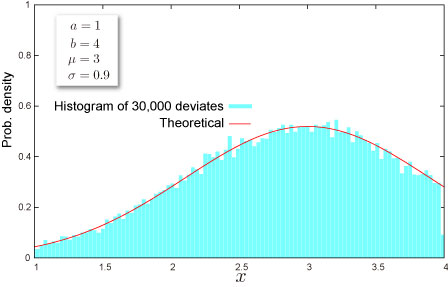NTRANDTRUNCNORM
Returns truncated normal pseudo random number(s) based on Mersenne Twister Algorithm which has long period (), high order of equidistribution (623 dimensions).
Syntax
NTRANDTRUNCNORM(
Size,
Min,
Max,
Mu,
Sigma,
Algorithm,
Random seed1,
Random seed2
)
Parameters
- Size is # of random numbers (Positive integer).
- Min is a lower limit of a support of the distribution .
- Max is a upper limit of a support of the distribution .
- Mu is a parameter the distribution .
- Sigma is a parameter the distribution .
- Algorithm is a integer value that determines a method to generate uniform random number.
- 0: Mersenne Twister(2002)
- 1: Mersenne Twister(1998)
- 2: Numerical Recipes
ran2()
- Random seed1 is 1st. random seed.
- Random seed2 is 2nd. random seed.
Remarks
- Parameters a and b must hold following relation: a < b
- The distribution has bounded support [a, b] (a < b)
Example

- The example may be easier to understand if you copy it to a blank worksheet
How to copy an example
-
Create a blank workbook or worksheet.
-
Select the example in the Help topic.
Note Do not select the row or column headers.
Selecting an example from Help
-
Press CTRL+C.
-
In the worksheet, select cell A1, and press CTRL+V.
-
To switch between viewing the results and viewing the formulas that return the results, press CTRL+` (grave accent), or on the Tools menu, point to Formula Auditing, and then click Formula Auditing Mode.
| A | B | |
|---|---|---|
| 1 | Data | Description |
| 2 | 1 | lower limit of support |
| 3 | 4 | upper limit of support |
| 4 | 3 | Value of parameter Mu |
| 5 | 0.9 | Value of parameter Sigma |
| 6 | Formula | Description (Result) |
| 7 | =NTRANDTRUNCNORM(100,A2,A3,A4,A5,0) | 100 truncated normal deviates based on Mersenne-Twister algorithm for which the parameters above |
Note The formula in the example must be entered as an array formula. After copying the example to a blank worksheet, select the range A7:A106 starting with the formula cell. Press F2, and then press CTRL+SHIFT+ENTER.